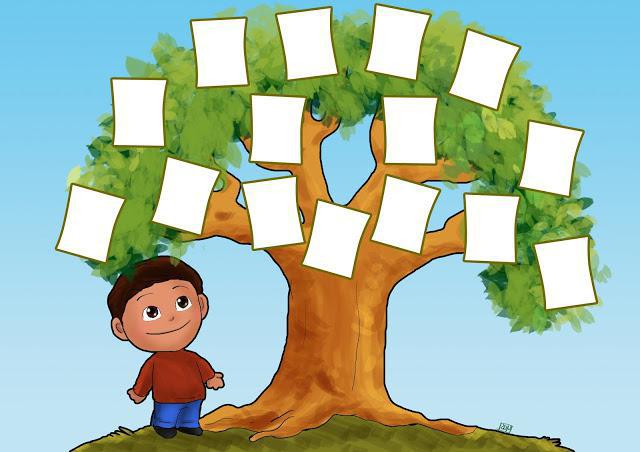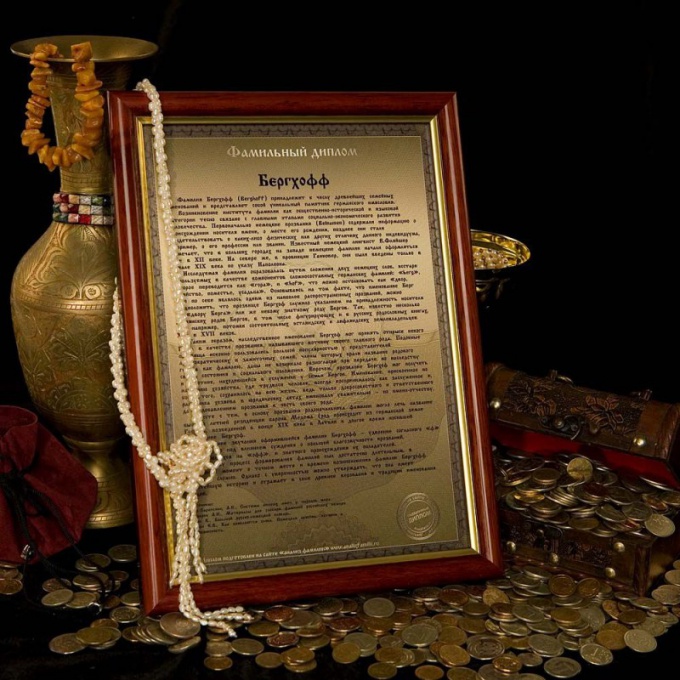Pedigree information. How to find your ancestor? Drawing up a family tree
Quite often in families there are different questions both about their relatives (distant and nearest), and about their ancestors. This usually happens when grandparents begin to reminisce about their childhood, how and where they grew up, what kind of relatives they knew. Based on these stories, you can try to make a family tree of your family, because thanks to this activity, it is quite possible to learn a lot about relatives. How to find your ancestor? Let's try to figure it out together.
What is the search for?
Every year more and more people are interested in their roots. The science of one's own ancestors attracts great amount people who are not indifferent to their ancestry. Some of them try to find their ancestors for the usual material purpose - either to get rich, or to go to their newfound relatives abroad, or because of the usual prestige, because their grandparents were once famous or belonged to a higher caste. Others begin the search with a simple human goal - they really want to know their kind.
How to find your ancestors?
In any case, this search is worthy of respect. But not everyone who decided to start this work knows how to find their ancestors in the archives. Where to apply? What do you need to know? How much is it? And this is not a complete list of questions that arise in the minds of people who wish to get acquainted with their ancestors.
How to find your ancestor? Here, of the two possible ways, you can choose the most appropriate for each situation. The first option is less expensive - this is an independent search. If the second option is chosen - with the involvement of professionals, it must be taken into account in advance that this service is paid and not very cheap. But the result of the work will be more accurate than in the first case, and faster.
Oh, those glorious soldiers!
In almost every family there is a person (or even more than one) who gave his strength in the name of the Great Victory of the 45th. Unfortunately, not all descendants of glorious soldiers and officers know a lot of information about their grandparents. How to find your ancestor who fought? And here various services will come to the rescue, thanks to which you can find out some details of their biography, their life, their feat. One of them is the project of the Ministry of Defense of the Russian Federation, which systematizes credentials and documents about soldiers who died in World War II and subsequent conflicts - obd-memorial.ru. There is also a regional youth organization - the search association "Trizna", which searches for missing soldiers. With their help, the problem of how to find your ancestor becomes not so difficult.

And it's very good, there is. After all, the phrase “no one is forgotten, nothing is forgotten”, known to everyone since childhood, turns out to be very correct, having received a new breath. Everyone who fought in difficult years on the side Soviet Union deserves to be not only known, but also remembered. So that the descendants keep this good memory in their hearts for many years.
Instructions for use. The beginning of time
To start compiling family tree, you can ask your older relatives about what they can remember from the history of their family. Moreover, it is recommended to find out not only names, patronymics, surnames and dates of birth - generally accepted information. When compiling the tree, you can also indicate other information that can only be found - interesting episodic moments from the biography of relatives, their place of residence, study, work, awarding honorary signs, orders and medals, perhaps even some hobbies. Thanks to such additional information, an ordinary tree can easily turn into a small encyclopedia of the history of one particular family.
Where did your last name come from?
No less interesting will be information about the history of the origin of the surname. To get at least minimal data, you can use a dictionary of surnames - both taken from the library and purchased at a bookstore. If the name is quite common, even in such a small reference book there is quite a brief information about the origin, time and place of its appearance. In addition, the class affiliation of the surname is also really detectable.

In the same way, you can find data on the social status of the owner of the surname. As an example, we can take surnames that end in “-sky” or “-sky” and are based on a Greek or Latin word, the name of a theologian or scientist, a holiday or a sacrament that is directly related to the church. The genealogy of the surname in this case will show that, most likely, one of the ancestors of the interested person was a student of the theological seminary, within the walls of which he received new surname. This applies, for example, to the variant that arose from the name of the Transfiguration holiday - Transfiguration. On the other hand, if the surname is shortened by several letters, but its remaining part is consonant with generic name famous noble family, it is possible that its carrier is a descendant of some aristocrat. Like Elizabeth Temkina, who was the illegitimate daughter and, according to rumors, the Empress herself. So searching for people by last name can give a lot of not only useful, but also fascinating information.
Decide on the types of pedigrees
There are two main types of pedigrees - ascending and descending. The first begins to be built from, so to speak, the applicant, from the one who begins to draw up his family tree. Then everything moves on to information about relatives - parents, grandparents, and so on.
At the head of the second version of the pedigree is the oldest founder that could be found. And after that, all his descendants are mentioned, including the applicant. Here it is possible to look at the whole family, at what distant relatives were doing.

Types of pedigrees can be considered a little differently:
1. Male ascendant - it includes only males. It looks like a regular line. Thanks to this pedigree, you can even determine your connection with some historical figure, or even famous person previous years.
2. Male descending - you need to choose the head of the clan and stretch the chain from him to the youngest man in this clan.
3. Ascending mixed - both men and women are indicated. Relatives are indicated in geometric progression - first 2, then 4, 8, 16, 32 and so on.
4. Descending mixed - relatives of both sexes are also indicated. Such a family tree contains several surnames and genera.
Such a compilation of a family tree is easy to perform. It is important to stock up on time and patience.
Search by last name
How to search for people by last name if there is information that they have moved to live abroad?
To begin with, it should be clarified whether the applicant really has relatives abroad, what are their last names, when exactly did they go abroad, what is their marital status, do they have children and where exactly did they move. If their country of residence is unknown, you can start your search with the most popular ones - Israel, the USA and Canada.

The archive of surnames will always provide invaluable assistance, because it is there, without even expecting it, that you can find useful information for yourself. To search in other countries, it would be good to know a foreign language. Also try to find relatives using worldwide search engines or social networks.
Search using archives
To at least try to find your relatives, you should contact the archive. There are a great many surnames, behind each of which there are human destinies, so there is hope that this method will be effective.
First you need to find out what the search period is, and go to the archive of the registry office. And already there - to submit a request to search for the information necessary for the customer or to come in person. Do not forget that not only registry offices have archives, but also, for example, in medical and educational institutions.

To obtain the information you are looking for, you should carefully study the sources - metrics, inventories of those living in the house, annalistic codes, the population census that took place in different years.
Another direction of search is the All-Russian Book of Memory, because it stores the data of the inhabitants of the entire collapsed Union. This book contains a very large database of citizens who participated in hostilities during the Great Patriotic War. The names of all people were grouped according to the places of conscription. It is also possible to get information about the merits - life and combat, from here, you can even find out where the person they are looking for is buried. Important and very necessary information for many people is found in as many as 750 volumes.
We do everything on our own
To understand how to find your ancestor, and as accurately as possible to recreate the family tree, you should go through several stages. Collect all the information, talk with parents, grandparents, aunts and uncles. Scan photos that have been saved. It would be a good idea to prepare a description of each one. It is helpful to look through several genealogical sites. And you can turn to professionals.
You need to figure out how to make a tree correctly: genetic diseases and characteristics, hobbies, habits, relationships between relatives - all this is important.

It is necessary to decide what type of tree will be chosen - descending or ascending. It would also be nice to choose a program for compiling a family tree. It's very simple, because there are a lot of them. Then put photos, links between relatives and the necessary designations into this program. As you search, add new information.
Now you can print the prepared tree onto a large sheet or, for example, make a book. A copy can be brought to relatives, who will also supplement the materials with information. Thus, the family tree will expand.
There is no way without trees in our life. Moreover, trees are important not only those with leaves and green, but also those with relatives and genealogical. The family is a powerful life foundation that gives support and strength in order to grow and develop. Without knowing his relatives, a person, in fact, does not understand who he is, therefore he cannot move forward. How to find your roots? You will find the answer in the article.
Why look for your ancestors?
After asking grandparents about genealogy, there are still a lot of questions and gaps in family history. Here the age of the forefathers plays a role, and the miracles of wartime, when people were either added years or removed. To collect information about your pedigree, you have to try hard or lay out a round sum of money to someone who will try for you.
A logical question arises: why then do this? For every reasonable question, there are reasonable answers:
- First of all, the family is the foundation, and no house is built without a foundation. A person needs to land in order to push off from this earth in the future and take off. Family and belonging to a certain group of people give strength for great achievements and victories. The fear of loneliness disappears, because behind each of us there is a whole clan. This is one of the basic human needs.
- Secondly, the search for relatives leads many people to absolutely different countries or regions. Once again it is confirmed that there is no pure nationality. With an understanding of his multinational pedigree in a person, nationalism, bloody fascism, just a bias towards some nationalities and stupid national pride are killed. No one bothers to be proud of our ancestors, but this does not mean that other nations can be belittled.
- Thirdly, it will help you better understand your health and the needs of the body. After all, most predispositions to disease are hereditary.
- Fourthly, this is just a wonderful tradition that will unite the family, making it even stronger, stronger and more friendly.
Drawing up a family tree
Having dealt with the purpose of the search, it is worth thinking about how to find out your roots. In an age of high technology and growing opportunities, there are really many ways to do this. How to find out about your related roots? The most obvious and systematic method is to compile a genealogical (family) tree.
You can start such a global project with parents who will help with the main branches. Next, we turn to grandparents. It is worth going around absolutely all relatives, including great aunts and second cousins: you never know who is the keeper of priceless information. Further, having the main tree in hand, there are several options:
- apply to the city archive;
- order the services of a genealogist;
- explore online resources on the topic of genealogy.

Studying the archive
The most reliable way to find out your roots by last name is to study the city archive. To be fair, this is also the most difficult path you can take. How to find out your roots by last name? The archive contains registers of birth and service records. You will be asked to give the name, patronymic, year and place of birth of your close or distant relative.
Studying books
It is also worth considering what religion your ancestors belonged to, at least approximately. Having decided, you can start searching in Orthodox consistories, rabbinates or Catholic deaneries. Better yet, all three.
Pay attention to such a valuable source of information as the All-Russian book of memory. This is a body of knowledge about everyone who participated in the hostilities of the Great Patriotic War. People are grouped by last name. It's nice that if the search for a relative is successful, then you can find out about his military merits. By the way, you don't have to go to the archives to get a book. It can be found freely available on the Internet.

There is also a book of memory of political repressions, books of industry, address books and various calendars of ranks. Getting access to all this information is not easy, but the result is worth it.
Services on the Internet
The most logical and simple way at the moment, how to find out your roots and pedigree, is the Internet. There are many ways here. Some of them are listed below:
1) Internet resource FamiliSpace. A wonderful portal created specifically for people who wondered how to find out their roots. Ancestors can be searched not only by last name, but also by profession, region of residence and year of birth. The site often replenishes the database, the information is constantly updated.
2) Various online directories. Portals http://www.vgd.ru/ or http://www.litera-ru.ru/ offer search by last name and first name. Other services are also provided there. We are talking about compiling a family tree, searching for and reconstructing the coat of arms of the family, creating family albums. The prices for such procedures bite, but it's worth it. The sites offer master classes on teaching self-study of the pedigree. They will just tell you where to start the search, how to find out your roots, help in compiling family tree.

4) Specialist services. Having ordered the work of a genealogist, you get a high-quality result. Then you will not need to spend time and effort. If it is important to get the result, and not the pleasure of the process, then the best way.
Family is the most valuable and intimate thing in life. It not only needs to be built, protected, created, but also studied. Hope is in knowledge! If we do not know our past, then the fate of repeating the mistakes of our fathers and grandfathers will become inevitable. expressed in the color of the eyes, hair, habits, character, even in the choice of professions.

Drawing up a family tree helps to collect valuable information about the health of loved ones, life expectancy, and professions of relatives. All this deepens a person's knowledge of himself, opens up new talents, offers new horizons.
Of course, such an event will be worth a lot of effort and cash investments. But, if you look at it, isn't the most important thing the journey that we lead through life? And then it is so important to know where we started it from and where we are striving to end up.
Now many people have become interested in their roots, the origin of the family. But the knowledge of the majority is limited brief information about great-grandparents. Nevertheless, you can find out the history of your family, even if documents and photographs have not been preserved. The surname can also tell a lot about the history of the ancestors. So, how do you find out your family tree by last name?
You will need
- - computer;
- - Internet access;
- - passport;
- - library card;
- - dictionary of surnames.
Instruction
Ask your relatives about family history. Collect even small information, but pay special attention to where the family lived, whether it moved, what grandparents did professionally.
Look up your last name in one of the last name dictionaries. It won't help you find out your specific ancestry, but it will point you in which direction to go. For example, such dictionaries may contain information in which geographical area the surname appeared, whether it is of foreign or Russian origin, in which social stratum it is common. This will narrow your search.
Explore the wartime aspect of family history. In particular, start your study with the "Book of Memory" - a relatively complete collection of the names of the dead and missing during the Great Patriotic War. It can be found in museums, major libraries and on the Internet in digitized form.
Go to the website of the Memorial Society. There, on the search page, enter the last name, first name and patronymic of your relative, who allegedly participated in the Great Patriotic War. As a response, the system will issue a list of the names of the dead and missing soldiers. In this list, you can specify the year of birth and death of your relative, as well as the place of birth, which will help you specify the search for relatives.
If you know the names of your great-grandfathers who, by age, could have participated in the First World War, find in the library a file of military magazines of that period, for example, “Russian Disabled”. They also published lists of the dead and missing.
After you have found out where your ancestors lived geographically, start searching the archives of the corresponding region or city. The difficulty is that you will not be allowed to personally enter the archive if you are not related to a research institute or do not study at the Faculty of History. But you can order in the archive a certificate or an extract from the documents you are interested in. A number of archives provide paid assistance to those involved in the search for a pedigree, for example, advice on which documents are best to refer to.
A person must know his roots. That is why many are so eager to restore the family tree, to find ancestors. However, this task is not easy, you will have to stock up on patience and perseverance, spend time and effort.

Instruction
First of all, specify the last name, first name and patronymic of your most distant ancestor. It is with him that the search for all the other relatives will begin, because a clue is needed. In addition to these data, you also need to know the year and place of birth of the person you are going to search for information about. After all, all the data about people in the archives is stored grouped not alphabetically, but by region over the years. This is how the priests made registers of birth.

Next, you need to contact the archive at the place of birth of your ancestor with a request. The request can be sent in person or by mail. Archive employees will look for records about the person you need in the parish registers. There can be indicated not only the date of his birth, but also the parents. So you can find information for further restoration of the pedigree. Indeed, in the records of the parents it can be indicated where they came from, to which class they belonged.

If your ancestors belonged to merchants, Cossacks, gold miners, etc., you can look for information about them in historical funds or the regional museum. But you will have to do it yourself, painstakingly working in the reading room. But there may be receipts, petitions of their ancestors and similar information.

Related videos
note
The discrepancy between the real and supposed date of birth of your ancestor should not be more than 5 years.
Helpful advice
Some state archives have special departments that search for ancestors and compile a family tree. But such a service is not cheap.
Interest in one's roots, in the history of one's kind, is increasingly emerging among our compatriots. People return to their past and try to recreate the life path of their ancestors. However, the social and political upheavals of the 20th century made it extremely problematic for many Russians to find their origins. Wars, revolutions, mass repressions and migrations of peoples - all this has mixed fates so much that sometimes it seems impossible to restore family history. In fact, this is not the case, restore your pedigree possible, even if there is practically no reliable information about the ancestors.

Instruction
You need to start searching for your roots with all the information at your disposal. Even if there are no longer living relatives of the older generation - grandparents, at least there is evidence of their death, birth certificates of your parents and their marriage. And this is already a sufficient starting point from which to build.
It is important to remember that all genealogical research is built on the basis of three basic principles: names of people, dates, and reference to the area (that is, the names of settlements and institutions). Only all together they allow you to recreate the exact history of the genus. Therefore, you should always begin your research with a detailed survey of all living relatives, even distant ones. Their stories and testimonies should be recorded in detail, Special attention paying attention to the three listed characteristics (exact names, dates, titles). You also need to collect all available family documents, including even the most seemingly insignificant ones like school diaries, hospital tests, or private letters and telegrams. The fact is that even such "highly specialized" documents may contain indications of certain places of residence of a person, the dates of his life events.
Documentary evidence of births, deaths, marriages of close relatives can be obtained from the registry office. According to Russian law, these documents are stored in the archives of the registry office for 70 years, after which they are transferred to the State Archives. At present, any citizen of the Russian Federation can obtain the necessary information upon a private request.
To collect information dating back before 1918, you need to refer to such documents as Registers of Metrics, Confessional Records, Revision Tales. Metrics or parochial books were kept in every church parish in Russia until the revolution of 1917. They contained three main sections: births and baptisms of parishioners, their deaths and marriages. After 1919, registers of births were transferred for storage to the registry office. Confessional records have existed since 1718. and contained information both about all the parishioners who attended confession and those who were absent from it. Revision tales are periodic censuses of the taxable population Russian Empire held every few years. They contained information not only about a specific representative of a particular class, but also information about his occupation and his family. These three sources are the main ones for recreating the history of any Russian family.
The First All-Russian Population Census of 1897 can also be of great importance for research. It contained detailed information about the composition of the family, the age of all its members, including children and infants, information about the occupation of adult family members, their household and property. The data of this census can be found today in the state archives.
In addition to the main named sources of data, it is also possible to use the archives of those institutions in which your relatives worked throughout their lives. Information about military personnel can be obtained from the Military Historical Archive in Moscow. This will require knowledge of the names and numbers of the military units in which the ancestors served, as well as the approximate dates of service.
Sources:
- How can a pedigree be restored?
To find out history his families You can apply to any organization that deals with genealogy. And you can do the study of the history of your own kind, an exciting, interesting activity, although it takes quite a lot of time. To be more productive, follow certain rules.

Instruction
To study the history of your family, you will need information about your relatives, both living and long dead. Start with people you know well. Write down all the information about your parents, then about grandparents, then ask both of them about other relatives. Next, look for information about earlier generations.
First, start looking for information at home - in the family archive, letters, diaries, notebooks, newspaper clippings, photo albums, on the backs of photographs. Pay attention to names, dates, place of residence, family ties. The study of these materials will make you look at your parents and grandparents differently, open up a world of their relationships and feelings, successes and failures.
For more information, talk to relatives. From their memories you can learn a lot interesting facts from the life of their ancestors, the motives and time of moving, changing jobs, true attitude to religion, get information about the financial situation, physical condition, appearance, habits, get acquainted with family histories. When talking with relatives, prepare a list of questions in advance with which you can easily guide the conversation without losing the thread of the conversation.
Use official documents, study found houses and found in archives. In the birth certificate you will find information such as the time and place of birth, last name, first name, patronymic of the parents. The marriage certificate contains information about the place and time of the marriage, the dates of birth of the spouses, the premarital surname of the mother. Certificate of dissolution of marriage - date of dissolution of marriage, place of its registration, postmarital surnames of the spouses. From the death certificate you will learn the time, place and cause of death. In addition to personal information about a person (name, date of birth, place of residence), the passport contains information about his wife, children (their names and dates of birth). There is also one or more photographs of the owner, there may be information about the blood type. Employment history gives information about education, places of work and positions held. Data on education, profession, awards and titles of ancestors may contain certificates, certificates, certificates, certificates, diplomas, order books. For men (and some women), the universal document is a military ID that contains all of this information, including: height, weight, head and shoe size.
Organize all collected information. Group material by topics in folders, authors, recipients, chronology. Fix in the form of a table or try to make a family tree. Of course, in some lines or boxes you will have empty spaces. Send partially completed tables to your relatives with a request to fill in the gaps with information known to them.
Many people are interested in their family history. A reliable pedigree allows you to feel your belonging to a long line of distant ancestors, and maybe even to noble noble families. Building your own pedigree can be a fun hobby or just a leisure activity.

You will need
- - some amount of money
- - passport.
Instruction
The first and main point in writing the history of one's surnames is to collect all possible surviving information about distant and close relatives, some events in their lives, biography facts, key dates, data on the place of residence and work. In search of this information, it is necessary to turn to living witnesses, friends, relatives, and acquaintances. After all, it is possible that the information that you want to receive has already been collected and organized by someone.
After interviewing all witnesses who may know something about your history surnames, it is necessary to turn to the collection of material evidence. Any personal belongings, old photographs, letters, some other documents can become a guiding thread leading you to a distant forgotten ancestor.
For information from bygone years, you can try to contact the state archives. It is in the archives that all old documents related to registrations are currently stored. civil status, work experience, places of residence and much more. In many Russian archives, registers of births of pre-revolutionary parish churches are kept, according to which the population was kept in the old days. Great help can be provided by the so-called. “revision tales” are an analogue of modern population censuses regularly conducted in the Russian Empire.
After collecting information, it is necessary to start organizing and systematizing it. Now, genealogy lovers are offered a lot of computer programs that facilitate the construction of a large family tree, which will take into account and arrange all the information about your desired relatives.
If, for some reason, you have not coped with one or more points of the search for your pedigree, you can always entrust the solution of the problem to professionals. Now in Russia there are many firms and agencies whose specialization is the search for archival information and the compilation of pedigrees. These organizations will also assist you in obtaining the appropriate representative certificate. surnames or, if there is a reason for that, including you in the genealogical books of the nobility.
note
Before asking for help in finding the history of your last name to the agency, you need to check that it has the appropriate license and good reputation.
Helpful advice
To go to the archive, you need to stock up on a passport and a certain amount of money.
Many people want to know origin his surnames. It determines belonging to the genus and connection with parents. By studying the family tree, you can understand the history of the whole family, find out about your roots, find new relatives.

Instruction
Try to find out the origin of your surnames on one's own. Highlight the root in it, on the basis of which it arose. Determine the meaning of this word, that is, you need to give an interpretation surnames. You must find explanations that are found in dictionaries for various dialects and reference books.
Contact the experts who will help you in such a difficult matter. You can order the whole study. They'll define the story for sure surnames, that is, they will provide information about when it appeared and by whom, as well as show the ways of its distribution. This is some kind of cipher or code of the family, containing the knowledge of the roots of your family, as well as its meaning.
Talk to your parents. Ask them what they know about descendants. Often stories about distant ancestors are transmitted in families. Perhaps luck will smile on you, and you will learn a lot about your surnames.
Start compiling a family tree. It is carried out in the form of a certain scheme. On the Internet, find a ready-made program and template for developing a family tree.
If your close or distant relatives do not help with the necessary information, then visit the city archive or library. You should be interested in various documents, including information about marriages, death and birth data.
Please note that this requires a lot of effort and time. Choose the most distant ancestor about which something is known. Surely you will find some certificates and gratitude for success in work and study, notes in the local newspaper. Surnames may vary slightly, but that's okay.
Helpful advice
You must investigate the difficult path of the historical development of your ancestors, from the appearance to the present. As a rule, it turns out the form that the surname had at the time of occurrence and before its modern interpretation. Without this modification, you will not be able to imagine a single surname.
Sign up for some of the most popular in social networks and try to find relatives with their help. Currently, millions of people are registered on these resources, and it is highly likely that you will be able to find those you need. Pay attention to the sites vk.com, odnoklassniki.ru and my.mail.ru, which are popular among the Russian audience. There is also a convenient search for a person by various parameters, starting with the last name and ending with existing habits and interests.
Try to find relatives through various online directories. In this case, it would be better if you know the exact or at least approximate location human habitation, because most of resources focused more on searching by place of residence than by name and surname.
If you decide to find relatives by last name, then get ready for the fact that it may not be as easy as it seems at first glance. But difficult doesn't mean it's impossible. Stock up on time and patience, and luck will surely smile at you.
Many people want to find their relatives with the same surname. And if earlier it was quite problematic, then with the advent of the Internet in every home, this has ceased to be an unsolvable task. There are many ways to find relatives by last name without much effort and financial costs.
How did the surnames appear?
The main search key will be the common surname. But one should take into account the fact that over time, surnames can change, acquiring completely unusual shapes. Therefore, if you could not find relatives by last name, view all possible options with the same root. Of course, this process can take you a lot of time and effort. But you must admit, the positive result will be worth it.
Usually relatives living in the same family have the same last name. Almost every one of us meets namesakes, but this does not mean that they are all your relatives. Also, you can often find a lot of similar surnames. For example, Petrov, Petrenko, Petruk, etc. They appeared in the process of distortion, when documents were not yet a mandatory attribute of every citizen. Then the surnames were transmitted orally, so there were many modifications and transformations.
How to find people related by blood
Write down everything you hear from relatives. Organize the information so you know where you need to start looking. Start searching in external sources, operating on the information received. Give preference to advanced search by last name on the Internet.
Contact the institutions where the registration data is stored. It can be housing, archives, telephone databases and more. Anything you can find will come in handy: census archives, metrics, birth certificates.
When you have enough real and virtual resources, you can easily figure out how to find relatives by last name without spending a dime. Such searches can bring you a lot of joy and pleasure. Maybe at the end of your journey you will find that you are a relative of some famous person or find another family. The main thing is to be patient and believe in the best.
Related videos
Helpful advice
If you do not have time for detailed genealogical research, you can order such a study to professionals. The cost depends on the specifics of each particular study.
The history of one's own family is of interest to every person. Listening to family legends, people are often carried away by the fate of their ancestors, family tree trying to learn as much as possible about them. Many want to reveal the secret of the origin of great-grandfathers, grandfathers and fathers in the hope that the continuous history of several generations will be the key to a wonderful future. After all, the fate of great-great-grandfathers often affects their descendants, and character traits are passed down from generation to generation.
Website Center genealogical research (CGI) was created specifically for those who want to find ancestors and distant relatives. The information presented here will be of interest to anyone interested in the history of Russia, including professionals in the field of genealogy.
CGI was founded in 1991. In 1992-1998, together with the Institute Russian history of the Russian Academy of Sciences was the founder of the international scientific journal "Historical genealogy / Historical genealogy", which was published in two languages in Yekaterinburg, Paris and New York.
In 2000, the Center for Genealogical Research published the capital work "The Ural Genealogical Book" (Yekaterinburg, 2000).
At the moment, the website RosGenea.ru presents family histories rooted in pre-revolutionary Russia. Now information on three million people is collected here, and the database is constantly updated.
A simple search by last name makes it possible to find information about people who were born in the territory of the former Russian Empire before 1917.
The system created on the site has no analogues in the network and greatly facilitates those who wish to search for ancestors and relatives.
From what sources can you find out the pedigree of a family?
Restoring family history is like unraveling a tangle. You just need to pull the right thread, and gradually new information will begin to appear.
The minimum information that a person who wants to find their ancestors should have is information about their place of residence. Much can be done with even this meager data.
Each archive has a so-called scientific-reference apparatus, which is a nominal card index, correlated with various funds for storing documents. Upon request, employees look for a reference to a particular surname in the card index, then they find a document in the required fund that mentions a person. For example, if he was convicted, then information about him should have been kept in the file cabinet of the Police Department.
In addition, registers of birth, ancient analogues of registry office books, serve as an important source of information. They included data on birth, baptism, marriage and death. These documents were kept in churches, and after the revolution were transferred to the archives. Some of them have been lost. The information contained in the metric can be found by sending a request to the archive of the area where the person lived.
When creating documents for the RosGenea.ru website, a huge amount of data is taken into account. The Center for Genealogical Research sets itself the task of creating a systematic list of representatives of various classes who lived on the territory of the Russian Empire.
The data is presented in chronological order and according to the person's place of residence.
In the near future, it is planned to collect information about all representatives of the nobility and merchant classes, and, if possible, provide information about the townspeople, raznochintsy and peasants.
A convenient and free search by last name on the site gives everyone an opportunity to find out their pedigree, find out the fate of relatives, contact with which was lost in ancient times. The past will reveal its secrets, and any person will be able to trace the fate of his kind, even if the information was considered lost.



















